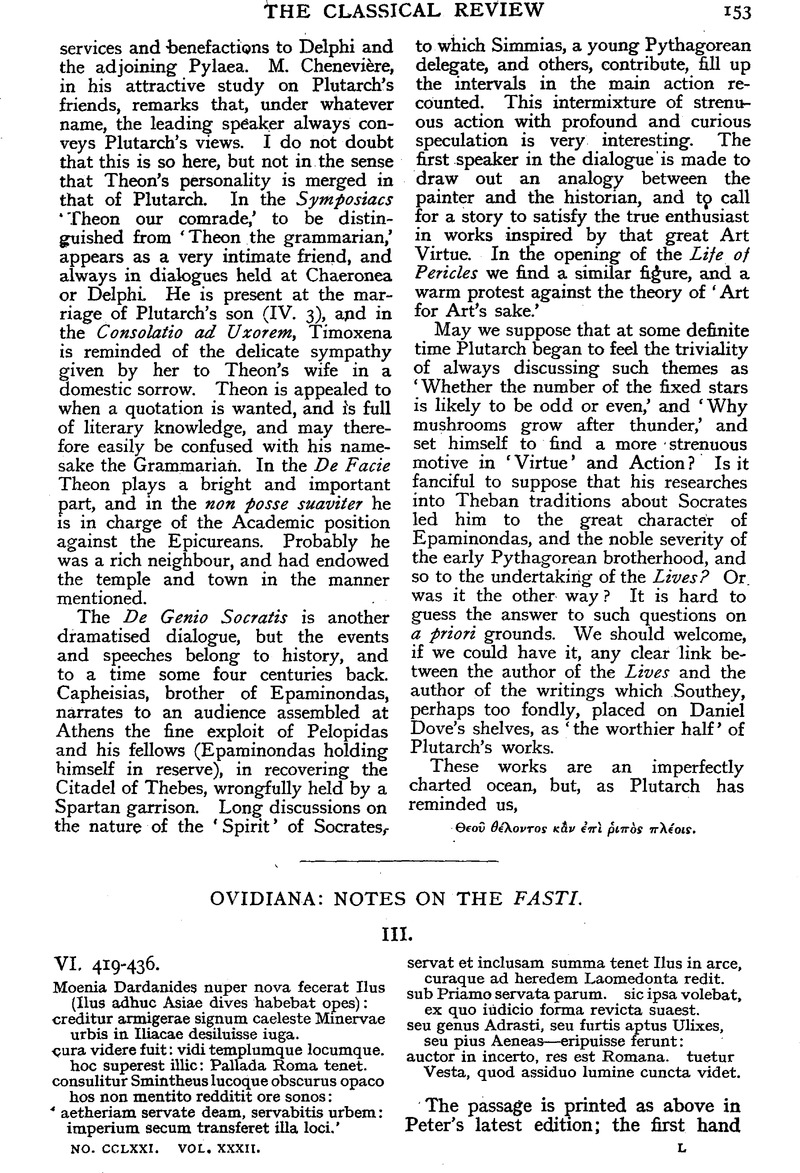No CrossRef data available.
Article contents
Ovidiana: Notes on the Fasti. III
Published online by Cambridge University Press: 27 October 2009
Abstract

- Type
- Original Contributions
- Information
- Copyright
- Copyright © The Classical Association 1918
References
page 154 note 1 Including Paley and Hallam.
page 154 note 2 He now brackets 433, 434.
page 154 note 3 He suggested, however, reading:
‘auctor in incerto. Praeses (or Praestes) Romana tuetur
Vesta, quod assiduo lumine iuncta videt.’ Vesta iuncta ‘quod videt iunctum Vestae Palladium, nempe quod eodem templo est sub Romanae Praesidis Vestae tutela.’
page 154 note 4 For Vesta and the penus Vestae, see Wissowa, R.K., p. 159, Warde-Fowler, R.F., pp. 145–154, R. E., p. 136; on the Palladium, see especially Marquardt-Wissowa, p. 252, n. 4, Preller-Jordan, R.M., I. pp. 298, 299.
page 154 note 5 The penus in which her sacra were kept is described as ‘locus intimus in aede Vestae’ (Fest., p. 250).
page 154 note 6 ‘Hie locus est Vestae qui Pallada servat et ignem’ (Trist. III. 1, 29).
page 155 note 1 Ovid tactfully ignores the fact that Metellus was blinded for his presumption in looking at the goddess (Pliny, N.H. VII. 141, Juv. VI. 265). Otherwise the comparison between Metellus and Augustus (453–457) would be ill-timed.
page 155 note 2 Tuetur (435) includes the notion videt (436).
page 155 note 3 Et rapuisse is more likely than hunc rapuisse; the affirmative et (like namque, enim, etenim) is not uncommon in parenthetical remarks—here are a few from a large number that I have noticed in Ovid: ‘credor (et ut credar pignora certa dabo),’ Fast. III. 74; ‘nee potes (et velles posse),’ Rem. 298; ‘sicut erant (et erant) culti,’ A m. II. 5, 45; ‘visa dea est movisse suas (et moverat) aras,’ Met. IX. 782. aut rapuisse is also not impossible, cf. Met. VIII. 513 ‘seu dedit aut visus gemitus est ille dedisse,’ cf. Fast. VI. 632.
page 155 note 4 In Hor. Odes IV. 7, 15 I am content to side with Bentley against Keller and Holder's Class I. and Class II. Pius has here ousted the more appropriate pater, see Bentley ad loc.
page 156 note 1 The substitution of pius and Romana was largely due to the ‘Suggestion de l'ensemble du contexte,’ assisted by optical resemblance, see Havet, Man. de C.V., pp. 142, 144. In III. 880 R has rome (rore), IV. 753 romulucum (ramo lucum), and there are other blunders of this kind. It is not impossible that pius was an explanatory gloss. Mediæval commentators regarded Pius as part of Aeneas’ name. The Commentator Oxoniensis says on IV. 41, 42: ‘Silvius Eneas qui fuit natus de Lavinia uxore Pii Enee et Postumus dictus quia post hum[an]ationem patris natus est,’ showing that for the writer ‘Pius Aeneas’ was on a par with ‘Silvius Aeneas.’
page 156 note 2 Lactantius Placidus has an interesting note: ‘arcanum nunquam inspectura pudorem: arcanum pudorem dicit aut eius simulacrum verum, id est Palladium, quod illicitum erat cernere—quo quidam quondam viso privatus est visu—aut virginitas,’ etc. (Theb. II. 740). This Lactantius, like his namesake of Nicomedia, was well acquainted with the Fasti—he quotes twice from the Sixth Book—and his note may be based on a reminiscence of our passage.
The inscription, first cited by Neapolis, Or. 2494, is spurious.
page 157 note 1 Prof. Housman proposed to read ab hoste revictum for the impossible ab Hectore victum in Her. I. 15: he cited this passage to establish the use of revincere = vincere in Ovid, see C.R. XI. p. 103. The only possible instance of revictus = victus in Prof. Housinan's list is Lucr. I. 593 (revicta = simply victa–Munro), but even in that place revicta seems to contain the notion vicissim victa; all composite bodies are vanquished in turn and changed into other substances —alid ex alio reficit natura. Suppose, says Lucretius, that the atoms were like composite bodies, that they could be vanquished in turn and changed into other things— ‘si primordia rerum / commutari aliqua possent ratione revicta.’ Revicta belongs to the assumption which he makes only for the sake of argument, and in this connection it is as appropriate as commutari.
page 157 note 2 Cf. IV. 121 ‘Caelestesque duas Troiano iudice vicit.’
page 157 note 3 Ciofani, Neapolis, and Barth (‘perperam notant grammatici Ovidium mediam pentametri syllabam nunquam corripuisse,’ Adv. XXXVII. 10). Carrio (Em. II. 10) points out that primus (714) and dederunt (715) are only glosses for princeps and tulerunt.


